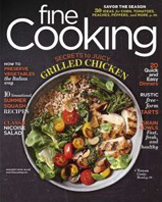
We tend to think that everything “fresh and natural” is good for our health, but many fruits and vegetables that you might think of as healthful have a darker side to them, too. Being aware of both the beneficial and the toxic parts means that you won’t unwittingly get caught by a plant’s natural defenses.
当涉及到生存,自然意味着业务。Plants can’t run from predators like animals can. To defend themselves or their young, plants resort to chemical warfare. If you’ve ever cried while chopping onions, you’ve been the victim of it. When you cut (or attack) an onion, chemicals that are usually locked in one part of its cells come into contact with chemicals isolated in another section, and the interaction produces a gas that irritates the eyes of animals, humans included. This can be a successful way for plants to drive away predators.
The seeds of many plants are poisonousto ensure the creation of the next generation. Apple seeds and the seeds inside peach and apricot pits all contain small amounts of cyanide—as few as 15 apricot seeds could kill a child. Fortunately, they’re rarely eaten accidentally; still, it’s wise to remove all seeds before serving. If you accidentally swallow an apple seed or two, don’t worry; you’ll be fine. Just don’t make it a habit. Lima beans, which are seeds, also contain a small amount of cyanide. When lima beans are cooked, the cyanide converts into a gas and escapes harmlessly into the air, rendering the cooked beans safe to eat. You shouldn’t, however, make raw lima beans part of your diet. Again, a few might be fine, but ingesting even tiny amounts of cyanide regularly can cause shortness of breath, difficulty walking, and vision and hearing problems.
Other types of beans, such as soybeans, navy beans, and black-eyed peas, can interfere with digestion if eaten raw. Enzymes in the beans (called protease inhibitors) cause chemical changes in the lining of the intestines that make it impossible for nutrients to be absorbed. The enzymes that cause these changes are killed by heat, so the beans are harmless when cooked.
Some plants are toxic if not prepared properly.Cassava (also called yuca and manioc), a root vegetable that is a major food source in many parts of the world, contains cyanide. In its traditional preparation—chopping or mashing followed by a resting period—enzymes in the cassava convert the cyanide into harmless compounds. As long as cassava is prepared in this way, it’s a nutritious food source. Some chefs today, however, roast whole cassava in its skin like a baked potato, and in this case, trace amounts of cyanide do remain. One roasted cassava once in a while probably won’t harm you, but every day, it might.
All potatoes contain harmless amounts of solanine, a toxin common to members of the nightshade family. A 7-ounce potato has about 10 milligrams of solanine, a tiny, harmless amount. But in the eyes of potatoes, the amount can jump to 200 milligrams and can cause stomach problems and neurological disorders. Also, the areas just under any greenish skin (which occurs when potatoes are exposed to light) contain high concentrations of solanine. Potatoes are perfectly safe to eat as long as you cut away the eyes and peel off at least 1/16-inch under any greenish parts.
Deadly leaves
You may have noticed that in grocery stores, fresh rhubarb stems are never sold with their leaves. This is because rhubarb leaves contain a poison that can cause organ failure—a healthy adult can die within hours after eating them. If you grow your own rhubarb (or know someone who does), be sure to remove and discard the leaves.























Comments
Leave a Comment
Comments